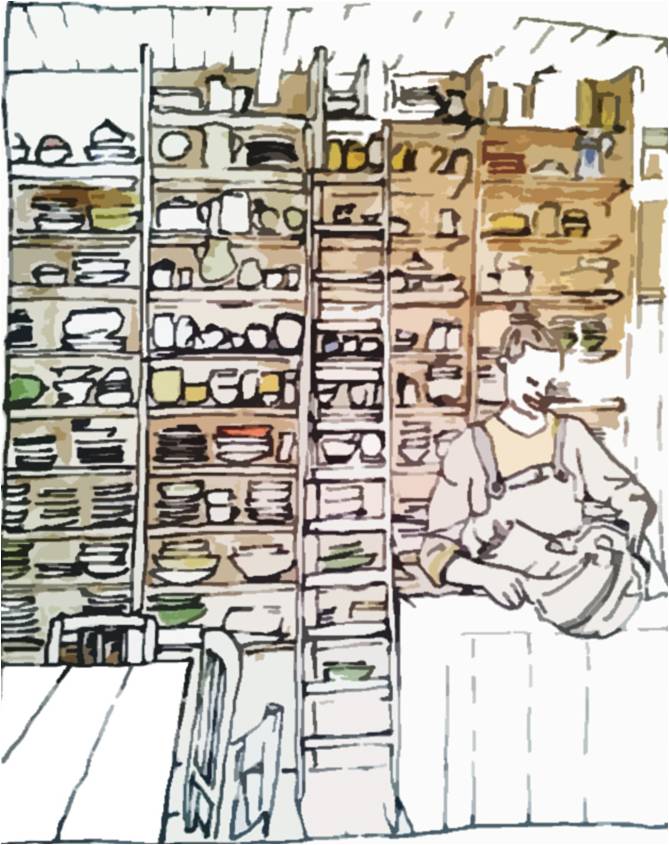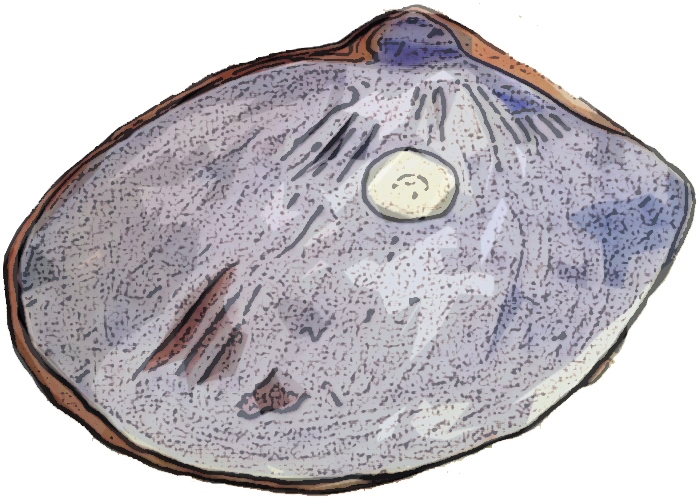R.T. Smith
Honey, you couldn’t of made a better choice. First time in Jugtown? Sure. Now that catback pitcher was slipglazed and dipped, hard fired in Inmore’s old-fangled groundhog kiln out under the mimosas, which are peaking, don’t you think? Girlie flowers, but they take the wind like a sail. Can’t say I had much a hand in this piece, but I helped load the wares and kept my eye on the cones while the clay scorched to bisque. When first I started, turning such a sweet curve on the wheel would give me shivers and smiles, making something pretty and useful and like to last. Base to lip, it felt nearabout like making a little person, and who don’t enjoy to play in mud? I had the touch. At two Andy Jacksons this one’s a steal, and suits your eyes, that blue. Yes’m, we take the VISA, we surely do.
Now bear with me a spell while I wrap your find in old sheets of The Pilot. As you can see I’m not so spry with this left arm. I have to move precautious, but you’d likely not guess I’ve got a science-made socket, portion of me like a space robot, part Teflon, part pure miracle. Early for such measures, I know, me just twenty years in the business. It’s hard on potters, though, all that working dirt – wedge and knead, then raising the loaf to a vessel, and we’ve got to lift and tote, not free even from the digging out ponds and creeks for the raw clay like so many ditch cutters. My brother Seth’s got an artificial hip he calls “art fish.” The kick wheel finally ruint him, way it throws the body a-kilter, stresses every join from neck to toe. By the way, I’m Hazelmae Revis, and my people used to run the Turn and Burn Pottery over in Star, but my sister Lily Revis Dartry moved up to Raleigh – type and file gal, Word 7, spreadsheets, all that – and when my husband Bill, who was never much into it nor up to it, left the Tar Heel State for long-haul Yonder in a Peterbilt, Seth and Pawpaw and me just could not shape and glaze and flame, display and sell and all that on our own. Wore us down till we finally had to board up T and B and hire out, which shamed him something awful. With Bill, we could of maybe made a go, but I don’t miss him – dull as a pug mill mule.
That’s a fine copper-glaze fruit bowl you’re gazing now. You’ve got a good eye. Anyway, that’s how I come to work the Whip-poor-will Pot Shed. Odd chores with no heavy lifting while my shoulder heals up. Since my dungarees always show spatter, you can tell I’m still close to the mud and slip and will turn a few mugs, lay on the horse-tail handles. I wrap all the sprinkled balls in burlap and keep them damp till the Inmores are ready to turn your bigger items. I swan, they’re fast as snakes and work from a book and a heap of mail orders. You know, us Seagrove generationals say we “turn” a pot, but drift-ins like half the owners now – Inmores, too – say “throw” a pot. I can’t feature it, as I know “throw” when I see it. But anyway, it’ll take ages to get the Tar Heel clay out of every nook on my body, and you see my hands, just hard, maybe like a sailor. Probably clay grit back between my teeth, too. Dust to dust, though, everybody’s journey’s end. Still, it takes a toll. Inmore says this clot gray on my britches is brain color, but I don’t much care for that. What my brain calls up is sea-blue green, when I’ve got time to notice.
He’s not an unfair man, I reckon, John Inmore, and is living his dream never to deputy again and to make something that has a lasting beauty. Pound it and squeeze it, spin and pinch, bisque and cook and glaze and cook again. His alkaline glazes pass for famous, that bowl there at your elbow, for instance. Careful now. Run your fingertips over that. It goes for upwards of a thousand and takes on the light, and his slab-built statues of Reality TV figures, why, they’re just a wonder. He says every day without a badge is a whoop-te-do for him, but he’s a little sly, keeping back some of my earnings, which he calls my savings account. You might say I’m nearbout a hostage. Even crook-winged, I’m a good worker, so he wants to keep me here a spell, but someday, boy howdy, come the right time, I’ll fly. I expect you know the feeling.
Raised up from the piney roots, kaolin and such-like rubbed deep into my nature, my dream ain’t the same as the boss. Let me hunt you up a box stout enough to keep that safe. String it up and make a handle strap. Pretty don’t mean it won’t break. Now me, I know sand is just another shade of clay, but I hanker to live by the ocean and stare at moonlight on the water like it was the most surpassing ceramic bowl, waves curling over akin to a vase rim, little white birds skippering where the tide makes lace. Pawpaw wants me to keep put, too, work for Inmore, Holly Hill, Raven or Winding Creek, anybody who’s in the Jugtown tradition, any close-by man-jack giving a good wage. He wants to see the old style, practical style, live on, milk crocks and ewers, churns, tableware, jar with a double strap handle, all that simple beauty going back to Donkel and Davis and Cash Penland, all those Penlands, a clan with the gift. In Biscoe, Troy and Whynot, places only the knowing still go to shop, you see that throwback set of glazes, kilns a century old, some still firing in pits like the Catawba Indians once upon a way-back. You should go up there, see with your own eyes.
I can appreciate it myself, but that’s not where the craft’s headed. To hell in a ham biscuit, you ask me. Now it’s novelties and birdhouses, everybody crazy for the face jug with its snarly look or goggle eyes and goofy teeth. Demons is what I feel. I’ve never took to them. They spook me. Some say – an Inmore surmise – they were first contrived as haint-chasers made by slaves to watchdog the family grave plots, and there’s others swear it’s a thing to keep the white liquor in or other fierce medicine up on the shelf to scare off meddling chaps. Child gets high enough to see that evil face, he might not be so eager for a closer gander. It’s the devil heads, though, that I won’t touch. I’m not deep religious, but to gather up clay from near where you abide and sleep and give it the horns and dragon color, that goatbeard and all, I call that taunting fate, and it’s a sharp reminder – you can see four or five in the back room if you want, top shelf, but I won’t handle them – yep, reminder that I have my own hopes that don’t involve what’s shoveled up and punched and spun like a whirlwind, then put in the fiery furnace. It’s come to favor Hades to me, and thinking on it pains my arm. I’m a victim is what I am and don’t hanker for no more punishment. Me, I want to smell the salt blowing off the sea, not some stinky stoneware glaze. I want to hear the ships bellow out beyond the wobbling buoys and watch the fishermen stitch up nets on the what-you-call-it . . . wharf, hear tall yarns about mermaids and whales, treasures and such. It’s all the foreign to me, what you call exotic, and I crave it.
I know: what chance have I got, who’s made of dust and studied dust, dirt in my mouth and mud in my hair, an earthwoman who’s never been even to Nag’s Head nor Ocracoke? But I’m young yet and I been told this arm will be fiddle-fit if I let it rest long enough. Beneath all this clay there’s skin that can blush, blood that’s not just rusty water. They can shape their own pots, “throw,” and be the slaves of all this. Arm aside, I’ve still got some few curves of my own, a sweetish disposition and urges to see where the world is joined, and I’m told green eyes like these were meant to behold the sea.
So here’s my secret. You’ve got to start somewhere. I’m contriving to sneak away from Seagrove – if that name ain’t a joke – leave all its hundred furnaces behind. No more serving the earth beneath my boots or jumping to the desk bell to see can I push a sale – present company accepted – no more lugging and wrestling rudeness into beauty. I mean to get a frilly dress and fashion my way of speaking to the modern style, show I’ve got my own charm. There’s a restaurant other side of Asheboro near the zoo, called Ezell’s Neptune Wharf and Buffet. I aim to train myself up to be a hostess with anchor menus and strut about in heels and little eyeglasses on a chain, have that hint of a swish in the walk, you know, just glide. A fresh start, clean wheel, a whole new life. Someday I’ll make my way to the coast and snag me a job right near the water so I can go out for a smoke, wade nekkid-footed along the edge, turn about in circles myself and feel the wind tickling my neck, blowing my hair all about, free. I mean to smell the salt and watch the crests come a- sparkle. Forgive my running off at the mouth like this. Gets lonely here off season, afternoon and overcast and all like this. You’ve got a kind face, and maybe you know exactly what I mean. Back home, when you gaze that pitcher on a shelf, you think of me, you hear? Someday I’ll have me a plastic tag pinned over my heart, and it won’t say Hazelmae or dirt or jug woman or sales. New life, new future, new name. You understand. I’m thinking about five green letters on a silver tag. Something fitting. Not throwing my life, like the new potters say, so much as just taking a turn. What do you figure? Kick me for a fool, but I’m thinking Pearl.
You watch that first step; it’s a steep one, and don’t worry your head about me. For now I’ve got my ocean dream. I’m on the mend, and I’m sufficing. Yeah, Pearl.
R. T. Smith is an award-winning poet, fiction writer, and editor. The author of twelve poetry collections and a collection of short fiction, Smith is the editor of Shenandoah, a prestigious literary journal published by Washington and Lee University. His poetry and stories are identified with Southern literature and have been published in magazines and literary journals such as The Atlantic Monthly, Poetry, Southern Humanities Review, and The Kenyon Review. Smith’s writings have won the Pushcart Prize, Library of Virginia Poetry Prize, and the Maurice English Poetry Award. Two of his poetry collections have been nominated for the Pulitzer Prize for Poetry.


